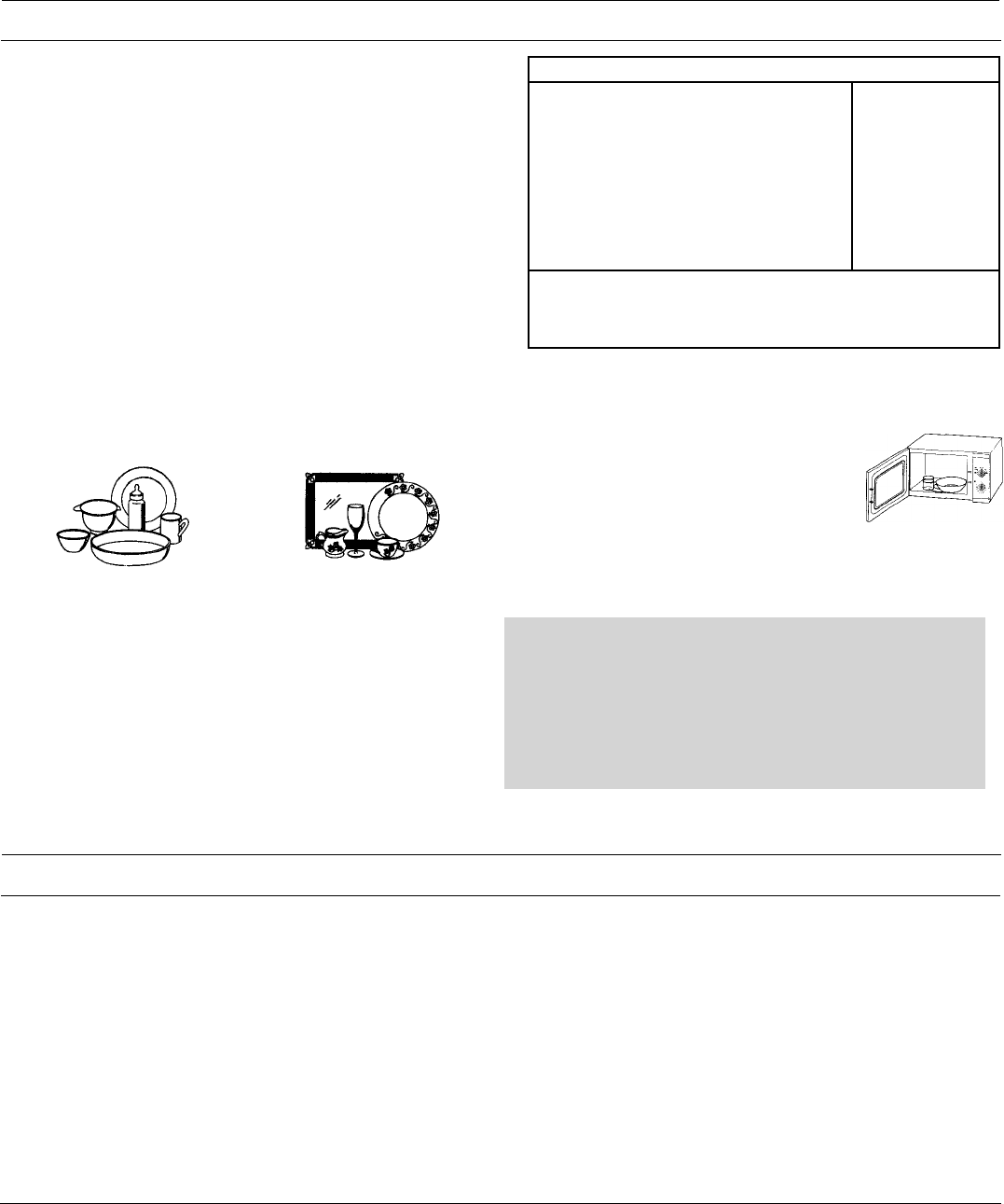
Which utensils can be used in the oven?
Utensils and cooking containers used in a microwave oven
should be of a material that allows microwaves to pass freely
through them. Generally this means that you should cook in
either (paper), plastic, glass or ceramic.
Utensils made of china and ceramic are excellent to use in
your microwave oven. Most types of glass are also very good.
Lead crystal glass can crack and should therefore, not be used.
Coloured glass or glass with decorations shall be avoided since
metal e.g. gold, might be part of the decoration and such
decorations will be damaged.
Plastics and paper can also be used, provided they can
withstand the temperature of the heated food. For cooking only
use plastics, which will withstand a temperature of over 120
0
C
Some plastic materials, e.g. melamine, will be heated by the
microwaves, and be damaged.
Round or oval shapes give the most even cooking. Square or
rectangular containers may over-cook foods in the corners
because more energy is absorbed there. Shallow containers
give more even cooking results.
Suitable
Not suitable
Metal containers, e.g. saucepans or frying pans should not
be used in microwave ovens.
Microwaves cannot penetrate metal. They will bounce off
any metal object in the oven just as they bounce off the metal
walls of the oven and cause “arcing”, a phenomenon that
resembles lightning.
Small pieces of aluminium foil can be used, but only to
shield the areas that would over-cook (e.g. for covering chicken
wings, leg tips and fish tails) but the foil must not touch the
side of the oven as arcing (damage) may occur.
Material
Microwave cooking
Glass (general)
Glass (heat resistant)
Glass-ceramic and ceramic (heat resistant)
Earthenware
China (heat resistant)
Plastic (general)
Plastic (heat resistant)
Aluminium foil containers / aluminium foil
Metal (pots or pans)
Paper
Yes (1)
Yes
Yes (1)
Yes
Yes
Yes (2)
Yes (2)
Yes (3)
No
Yes
1. Without metal parts or metal trims.
2. Some plastics are heat-proof only to certain temperatures.
3. It is possible to use aluminium foil to shield delicate areas of
food (this prevents over-cooking).
To find out if a certain container is suitable,
the following simple test can be made:
Place the empty container and a glass of
water inside the microwave oven. The water
is needed because the oven must not be
operated empty or with empty containers. Let
the oven work on full power for one minute. A suitable
container will only be lukewarm.
Aluminium foil containers and microwaves
It is now possible to use disposable aluminium foil containers
* Aluminium foil containers should always be used singly in a
in this new generation of microwave ovens, providing these
microwave oven, and placed on the glass turn-table
simple rules are followed:
provided.
* Always remove foil-laminated fibre board lid from the
* Follow the instructions provided by the food producer to
container before heating, otherwise oven damage can occur.
ensure thorough heating of the food product throughout.
* Only undamaged foil containers may be used.
If you are using a foil container for self produced foods they
* Aluminium foil containers with a height exceeding 3 cm
* may take longer to heat than when using plastic, glass,
should be avoided and the container must be at leas t
2/3
porcelain or paper containers. Always ensure the food is
full.
piping hot (minimum 72
0
C) before serving.
* There must be a minimum of 1 cm between the aluminium
foil container and the walls of the oven, to avoid sparking.
A useful tip is to place the foil container in a heat resisting
glass or plastic bowl, adding some hot water (not more than 1
cm deep) to provide heating for the foil container base. Stir if
appropriate or let the food stand for 2-3 minutes after heating,
to assist heat distribution within the container.
10
CAUTION!
There are a number of accessories avaliable on the market
Before you buy, make sure they are suitable for microwave
use.
When you put food in the microwave oven, make sure that
food, food supports or covering do not come in direct contact
with any of the internal walls or the ceiling of the cavity.


















